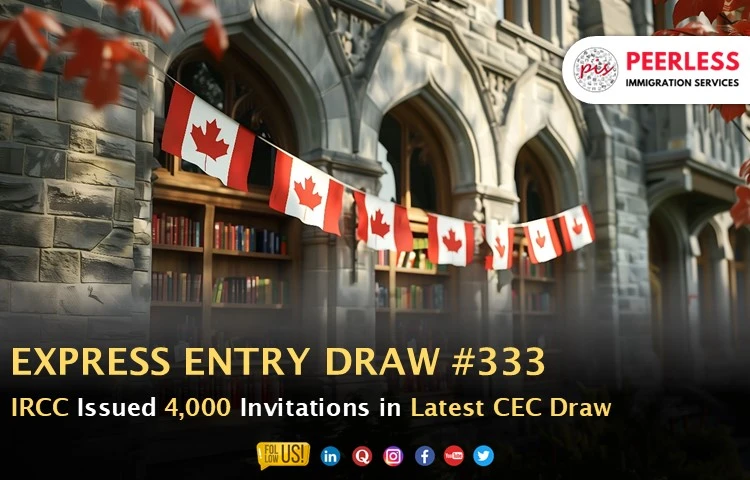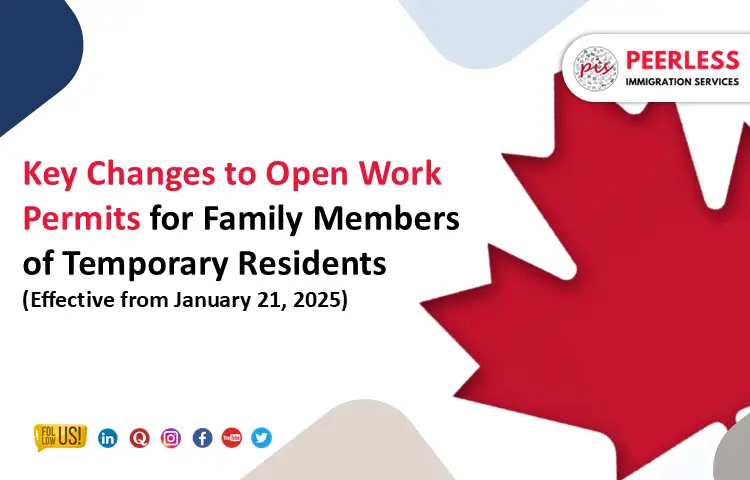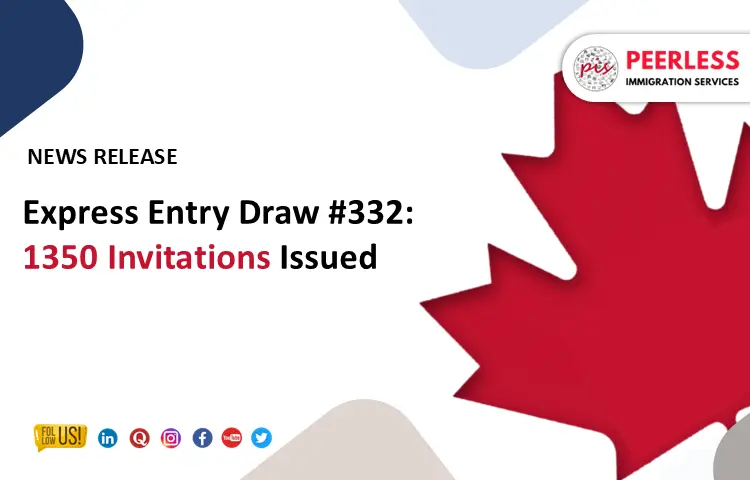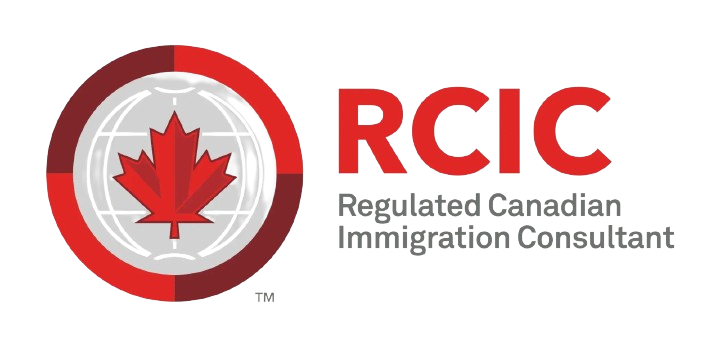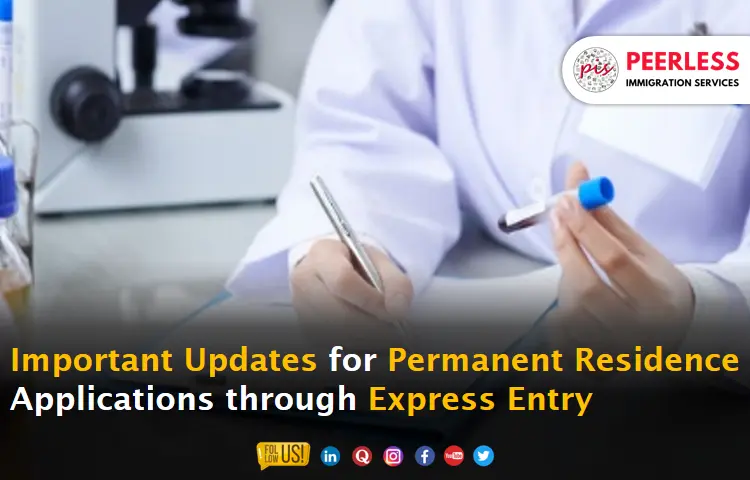
Important Updates for Permanent Residence Applications through Express Entry
New Application Deadline: If you get an invitation to apply for permanent residence on or after June 29, 2021, you must send in your application within 60 days.
No More Upfront Medical Exams: Starting from October 1, 2023, you do not need to include medical exams with your application when applying through Express Entry. If you do, your application will not be rejected, but you will be told when to get a medical exam later.
When Applying for Permanent Residence through Express Entry:
- You must submit a complete electronic application (e-APR) within 60 days of getting an invitation to apply (ITA). You do this online through your account.
- Your application is checked for completeness right away. If it’s not complete, it will be rejected, and you’ll get your application fees back.
- The 6-month processing time starts when your application is submitted, and it ends when Immigration, Refugees and Citizenship Canada (IRCC) makes a final decision.
- A complete application includes the e-APR, the required fees, and all the documents that prove the information in your Express Entry profile and e-APR.
- In special situations where delays happen beyond your control, the processing office might be more flexible. Check the document checklist for more details.
- Each Express Entry application is looked at individually, and the final decision is based on all the information available to the IRCC officer at that time.
Document Checklist:
When you submit your application online, you’ll receive a personalized document checklist. This checklist tells you which specific documents are needed for each family member on your application.
Translation of Documents:
If a document is not in English or French, you must provide a translation. Here’s how:
- Get an English or French translation by a certified translator. If that’s not possible, you can provide a translation along with an affidavit (a statement) from the person who did the translation.
- The translation package should include a copy of the original document used for translation, and the translation itself in English or French. Both the original and translation should either be stamped by the translator or mentioned in the affidavit.
- You also need to provide a scan of the original document or a certified photocopy of it.
Mandatory Documents for Everyone Applying:
All applicants must provide certain documents, or their application will be rejected, and they’ll get their fees back.
Medical Examination Confirmation:
This document shows that you and your family are healthy. Here is what you need to know:
For applications before October 1, 2023:
- You need to get a medical checkup, and it should still be valid when you apply.
- Put the medical checkup number in your online application.
- Include a copy of the information sheet or report from the doctor who did your checkup.
- It’s a good idea to get the checkup close to when you apply to avoid delays, unless something out of your control happens, like the doctor cancelling the appointment at the last minute.
For applications from October 1, 2023, onwards:
- You don’t need to do a medical checkup when you apply. They’ll tell you when to do it later.
- If you already did a checkup, upload a copy in the designated field.
- If you didn’t do a checkup yet, just upload a blank document.
- If there’s no record of your checkup, they’ll give you instructions on when and how to get it done.
Who Needs to Provide This?
- The main applicant
- Their spouse or partner
- Their children, including those not coming with them
These documents are needed to check if you or your family have a criminal record or could be a security problem for Canada.
What You Need to Know:
- The system will tell you which police certificates you need based on your personal history and where you’ve lived. But sometimes, an officer might ask for more.
- If you live in your current country, the police certificate must be issued within the last 6 months.
- For countries you used to live in, the certificate must be from after the last time you lived there for 6 months or more.
- Even if a certificate has expired, it can still be accepted if it meets the above rules.
- You must provide police certificates for every country (except Canada) where you lived for 6 months or more in the last 10 years. You don’t need them for when you were under 18.
- Your certificates should be scans of the original documents in colour. Copies that aren’t certified or authorized won’t work.
- If you don’t include a needed police certificate or supporting documents, your application will be rejected.
- Sometimes, officers might need more documents than usual to make a decision. They can use other information if necessary.
- If a country won’t give you a police certificate and only talks to Canadian authorities, follow the usual process to get the needed documents.
- In special cases, you can provide proof that you asked for a police certificate and explain why there was a delay. This isn’t a guarantee it will be accepted, but it might be in some situations. Include this proof in the specific country field.
Who Needs to Provide This?
- The main applicant
- Their spouse or partner
- Dependent children aged 18 or older, even if they aren’t coming with you.
Biographical Data Page of Passport or Travel Document:
- Purpose: To make sure you are who you say you are.
- What you need: A clear copy of the main page of your passport or travel document with your personal information.
Proof of Work Experience:
- Purpose: To show that you have the work experience required for the program you’re applying for.
- What you need:
- For each job you’ve had, you should have a letter from your employer. This letter should:
- Be on the company’s letterhead (their official stationery).
- Include your name, the company’s contact info (address, phone, and email), and your supervisor’s name, title, and signature.
- List all the positions you’ve held, with details like your job title, what you did, whether you still work there, dates you worked, how many hours you worked each week, and your yearly salary with benefits.
- If you were your own boss (self-employed), you’ll need proof like business registration documents, proof of income, and statements from other people who can confirm the work you did. Just saying what you did on your own isn’t enough.
- If your work experience is in Canada, you might also need copies of tax documents from the Canada Revenue Agency (like T4 slips and assessment notices) that match the years you worked there.
Remember, these requirements apply to:
- The main applicant
Their spouse or common-law partner (if they’re claiming work experience in Canada).
Mandatory Documents
Birth Certificate or Equivalent Document (if you have dependent children):
- Purpose: To prove that your children are really your children.
- What you need: If you have kids who are coming with you, you should provide their birth certificates. If the birth certificate isn’t available, you can explain why and provide a letter instead.
- Who needs to provide this: All your dependent children, even those not coming with you?
Proof of Studies (Education):
- Purpose: To confirm your education and make sure you meet the program requirements.
- What you need: To get points for your education, you can either show that you completed a Canadian high school or college program or get an evaluation of your foreign education called an Educational Credential Assessment (ECA). If you completed studies in Canada, you need to provide documents like certificates, diplomas, or transcripts. You’ll also need to tell them the number of the Canadian school where you studied.
- Special Note: If it looks like you did most of your Canadian studies online or from another country, the immigration officer may ask for more proof. If you got more than half of your education this way, you won’t get extra points.
- Who needs to provide this: The main applicant and their spouse or common-law partner?
Remember, if you don’t provide these documents when you should, your application might be considered incomplete, and you might get your fees refunded.
Provincial or Territorial Certificate of Qualification
Purpose: This is needed to confirm if someone has a certificate that proves they’re qualified in a specific province or territory.
Requirements: You only need this if you say you have one. You should provide a copy of your certificate.
Who Needs to Submit?
- The main applicant
- Their spouse or common-law partner, if they have one
Offer Letter from the Employer
Purpose: This is needed to make sure your job offer in Canada meets the program requirements and to check for fraud.
Requirements: You need this if you claim to have a job offer. The letter from your employer should:
- Be on the company’s letterhead with their contact info (address, phone, email).
- Include your name and the name, title, and signature of your future boss or HR person.
- Mention when you’ll start, confirm it’s a full-time paid job for at least a year after you get your permanent resident visa, describe your job, tell your current job status (if you have one), say how many hours you’ll work each week, and mention your salary and benefits.
- If your job offer has a Labour Market Impact Assessment (LMIA), you might need to provide the LMIA number later.
Who Needs to Submit?
- The main applicant
Proof of Funds
Purpose: This is to check if you have enough money based on the number of people in your family. It’s compared to a specific amount called the low-income cut-off (LICO).
What You Need to Show:
You should give official letters from your bank or other places where you keep money and owe money (like credit card debts and loans). These letters should have:
- Your name
- Contact info for the bank (address, phone, email)
- Account numbers
- When you opened each account
- How much money is in each account now and the average amount over the last six months?
Additional Documents:
Sometimes, they might ask for more documents if needed.
Common-Law Union and Cohabitation Proof:
Purpose: To confirm if you’re in a common-law relationship.
Required for: Only if you say you’re in a common-law relationship.
What to provide:
- A form called “Statutory Declaration of Common-Law Union.”
- Proof that you’ve lived together for at least 12 months. This can include:
- Copies of bank account statements you share.
- Copies of rental agreements (leases).
- Utility bills in both your names.
Marriage Certificate:
Purpose: To confirm if you’re married.
Required for: Only if you say you’re married.
What to provide:
- Your marriage must be legal where it happened and in Canada if you’re applying there.
- If you married in Canada, give a copy of the marriage certificate from the province or territory where it happened.
- If you married outside Canada, give a copy of the legal marriage certificate from that country.
Divorce Certificate and Separation Agreement:
Purpose: To confirm if you’re divorced.
Required for: Only if you say you’re divorced.
What to provide:
- If you divorced in Canada, provide a copy of the divorce order or certificate from the province or territory where it happened.
- If you divorced outside Canada, provide a copy of the legal divorce certificate from that country.
- If you have a legal separation agreement, provide a copy if you have one.
Death Certificate:
Purpose: To confirm the death of a spouse or common-law partner.
Required for: Only if you say you’re widowed.
What to provide:
- A copy of the death certificate or a legal certificate from the country where the death occurred.
Adoption Certificate:
Purpose: To confirm if a dependent child is adopted.
Required for: Only if you say a child is adopted.
What to provide:
- A copy of the adoption certificate or other legal papers about the adoption from the country where it was finalized.
These documents are needed from the main applicant or, in some cases, their spouse, common-law partner, or dependent children.
Documents You Need to Submit with Your Immigration Application
When you apply for immigration, you’ll need to provide some important documents. These documents help prove your eligibility for the program you’re applying for. Here are the key documents you may need to submit:
Proof of Relationship to a Family Member in Canada
Purpose: To show that you have a family member in Canada who is a Canadian citizen or permanent resident. This can earn you extra points in some immigration programs.
What You Need to Provide:
Copies of your family member’s Canadian citizenship document, Canadian birth certificate, or p What You Need to Provide: Digital photos that meet the specific requirements set by the immigration authorities
Who Needs to Provide This: You (the main applicant), your spouse or common-law partner, and your dependent children (even if they are not coming with you)?
Other Name
Purpose: To confirm your identity and check for any other names you’ve used in the past to prevent fraud.
What You Need to Provide: Information or documents about any other names you’ve used. This could be a maiden name or any other names you’ve gone by. You might need to explain or provide legal documents for name changes.
Who Needs to Provide This: You (the main applicant), your spouse or common-law partner, and your dependent children (even if they are not coming with you).
Authority to Release Personal Information to a Designated Individual Form [IMM 5475]
Purpose: This form allows you to appoint someone to ask about your application status or update your contact information.
What You Need to Provide: The form IMM 5475, signed by you (the main applicant) and your spouse or common-law partner if they want to share information with the same designated person. If your dependent children are 18 or older, they need to fill out their own form if they want to authorize sharing their information.
Who Needs to Provide This: You (the main applicant), your spouse or common-law partner (if applicable), and your dependent children (if they’re 18 or older).
Other Documents
Purpose: You can use this to provide any extra information you think is important for your application. It’s optional, but it can be helpful.
What You Need to Provide: You can upload various documents in this section, including those supporting a declaration of being “legally separated,” the Authority to Release Personal Information to a Designated Individual form [IMM 5475], or documents related to a disability and the need for accommodations.
Who Needs to Provide This: You (the main applicant), your spouse or common-law partner, and your dependent children?
These documents are essential to complete your immigration application properly, so make sure you provide them as required.
Feel free to reach out to us for answers to your questions. You can contact our expert at +91-8595010514 or send an email to info@peerlessimmigration.com
